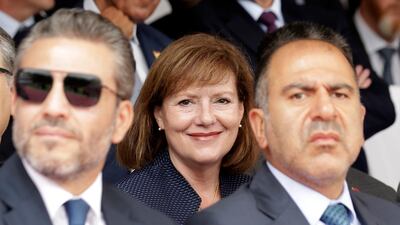The US Embassy in Beirut publicly criticised politicians who have exploited a deadly shooting for political gain, in a rare move that has been widely interpreted as a warning to President Michel Aoun’s party, the Free Patriotic Movement.
Since two bodyguards of a junior Druze minister, Saleh Al Gharib, were killed over a month ago, the FPM and its political ally, Iran-backed Hezbollah, have been campaigning to sideline Lebanon’s most influential Druze leader, Walid Jumblatt, who has close ties to the West and is a strong critic of the Syrian regime. Fearing that tensions would boil over, Prime Minister Saad Hariri has not convened the cabinet since July 2.
But mediation attempts have failed and the war of words between both camps increased this week. Mr Jumblatt’s Progressive Socialist Party (PSP) accused the FPM of putting pressure on judges charged with investigating the shooting to find the PSP guilty of attempting to assassinate Mr Al Gharib, paving the way for a show trial against Mr Jumblatt in a special court that handles only state crimes. The PSP wants the incident to be handled by the regular judiciary, arguing that the incident was spontaneous and happened in response to Mr Al Gharib’s bodyguards shooting at a crowd of protesters.
“The United States supports fair and transparent judicial review without any political interference. Any attempt to use the tragic June 30 event in Qabr El Shamoun to advance political objectives should be rejected” the US embassy said in a tweet on Wednesday. “The US has conveyed in clear terms to Lebanese authorities our expectation that they will handle this matter in a way that achieves justice without politically motivated inflammation of sectarian or communal tensions.”
President Aoun has not publicly reacted to the tweet.
The US embassy did not immediately respond The National's request for clarification whether its tweet was referring to the alleged interference by the FPM, but Moustapha Allouche, a member of the prime minister's Future Movement party, said it was a clear hint that Washington could take action against the Lebanese president or his party if the anti-Jumblatt campaign continued.
“I think everybody understood it the same way,” he said.
“This is a clear message that the US is not happy about the president’s political role, which could undermine American support,” agreed Imad Salamey, a political analyst. The US is one of Lebanon’s main international backers and has provided aid worth more than $2.29 billion to the Lebanese army since 2005.
Mr Hariri is leaving for the US on Friday on a private visit, but there are plans for him to meet Secretary of State Mike Pompeo next Wednesday, sources told The National. However there are no plans for him to meet President Donald Trump or Vice President Mike Pence.
There have been rumours that the FPM could be the next to face US sanctions after the Treasury Department took the unprecedented step of targeting elected Hezbollah officials on July 9.
The FPM's leader, Foreign Minister Gebran Bassil, makes no secret of his strong ties with Hezbollah and defended the group’s right to bear weapons in a Euronews interview earlier this week, arguing that it was “not an armed group”, but an “essential component of the country”. President Aoun, who founded the FPM, signed a political alliance with Hezbollah in 2006.
Labelled a terrorist organisation by the US, Hezbollah is the only Lebanese militia that kept its weapons at the end of the civil war in 1990, in the name of the struggle against Israel. While it still functions as a regular political party in Lebanon, Hezbollah has also morphed in one of the region’s most powerful paramilitary groups.
Mr Salamey said the US administration’s interest in Mr Jumblatt’s fate should come as no surprise. “Everyone meddles in Lebanese affairs. US 'neutrality' has only weakened its allies’ position as Hezbollah has become stronger this past decade,” he said. “Today, the situation is slipping out of the US' comfort zone, which is why it is stepping in to reassert its support to its partners."

